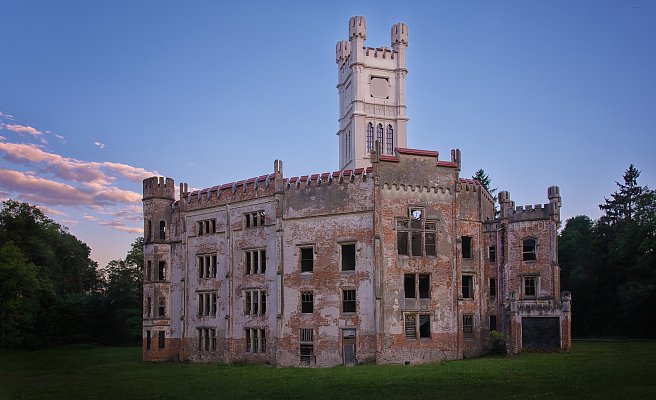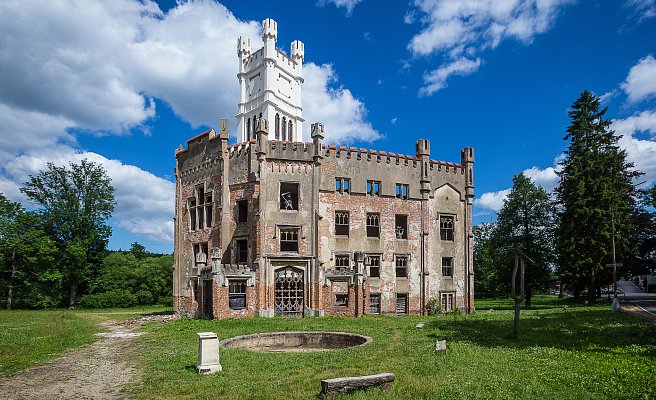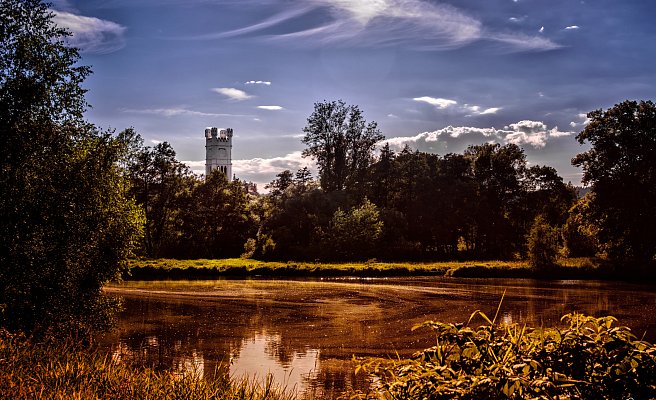


The Český Rudolec Castle, often called Little Hluboká, is hard to overlook, since its four-sided Neo-Gothic tower can be seen from far away. During the season, it’s always open from Wednesday to Sunday, and up to 200 visitors arrive over the weekend.
In the 14th century, this served as a fortified guard castle and later a water fortress on the route between Prague and Vienna. The castle was reconstructed in Renaissance style in the 16th century. It burned down in 1860 and was subsequently rebuilt in Neo-Gothic Tudor style on the example of the Italian castle Miramare near Trieste. The castle’s last owner was the family of Reinhardt-Picchioni. Curt Reinhardt, an industrialist from Lusatian Bautzen, married into the Picchioni family and died in 1932.
The post-war developments affected this area as badly as it did elsewhere in the country. The castle was unused and unsecured, and the Reinhardt property was confiscated and nationalized. Moreover, a prison camp for nearly a hundred thousand prisoners of war was set up in the forest near the village. Shortly after the epidemic outbreaks, the castle was used as a quarantine center. In 1948, most of the buildings were assigned for use by the local “Státní statky” state agricultural concern, and the chateau served as accommodation facilities for employees and farm staff.
In 1989, the castle was transferred free of charge by the District National Committee in Jindřichův Hradec to the Chýně JZD agricultural co-op, who began repairing the site. Funds were soon exhausted, however, and the castle was soon abandoned again. A drawn-out legal battle ensued between the Chýně JZD and the state concerning the site’s ownership. This ended in 1998 with ownership falling to the state. During the years of the dispute, the fate of the castle was the subject of interest of former Czech Parliament member Michal Prokop, as well as singer Karel Gott and hockey champion Jaromír Jagr. Finally, in 2001, the site was transferred to the administration of the village, thus ensuring that no further destruction would take place. In 2009, the castle site was purchased by the Brno company PENA PLUS with a clear objective: to save the unique castle building and complex in Český Rudolec. Together with the civic association “Paměť Rudolecka”, several short-term projects have been successful in cleaning up the buildings and castle parks and providing the public with temporary access to the castle.
The years 2010 and 2011 meant a final awakening after a long sleep for the entire castle and complex; the dangerously falling battlements were repaired, drainage was installed for the building, and reconstruction began on the 30-meter tower. With the help of the Ministry of Culture and thanks to the cooperation of the National Heritage Institute staff, reconstruction work continued on the roof.
The PENA PLUS company was renamed and is now Malá Hluboká. It owns the castle, the pub, the information center in the historic castle manager building, the adjacent buildings, and the park opposite the castle. After 118 years, the tradition of brewing beer in Český Rudolec was restored in the local inn, and visitors can take home kegs and bottles of the local Grasel beer. The tenacity and efforts of the Malá Hluboká company have given hope in recent years to renewing the glory of the castle. This, despite the fact that from the empty window frame of the second floor of the castle, the grim reaper (known to the locals as Magda) looks on, accompanied by Evžen the raven..
Nearby tips: Grasel’s Trail Named after the notorious robber Grasel (whose name is now synonymous for “grázl”, the Czech word for bastard) from Český Rudolec. The trail leads about 9 kilometers along a wellmarked path.